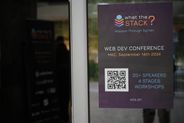DevRel, not DevSell
On the fine art of DevRel, what it is not. And how to get started.

DevRel is about development and relationships. It’s in the name.
Let’s kick this one off with a question. Why do people go to conferences? Meetups? Easy answer, one might think - enthusiasm. I agree with that, being an active eventgoer myself. I’m also motivated by my drive to move to a DevRel career. But, even before I thought of becoming a DevRel person, I enjoyed tech events. Most of them, anyway.
Attending a conference or a meetup usually means getting exposed to new ideas or learning something new. So, we can agree that there is educational value to these kinds of events. What about the other side of events, though? Not the organizers’ perspective (I’ve covered that before), but rather the DevRel people that attend for various reasons. Whether speakers, sponsor-sent representatives, or otherwise - what’s the primary driver of these people? I’m not a betting man, but I’d wager that a few of my readers would respond with “to educate” as a first choice. A second or third, but indeed not first. They certainly have exciting things to say, but it’s often driven by a product or a service they are trying to advocate for. There’s nothing inherently wrong with that, but that’s not what DevRel is about. At least, not primarily.
So, to summarize - people pay money (sometimes) and come to get exposed to new ideas and learn, not to see you advertise your company.
So, what is DevRel anyway?
DevRel can be summarized in three words - education, relations and engineering. So let’s dive into each (in no particular order).
1. Education
One of the pillars of DevRel is education. Your own, as a DevRel, and that of your developer audience.
Whenever I think of DevRel, one of the first thoughts that pop into my mind is content creation. However, this particular flavor of content creation is primarily about education. Regardless of platform - writing, videos, live coding, speaking - we get in front of our audience to teach something, learn something together, or explore an idea.
Any product promotion or marketing should come second to the educational aspect.
2. Relations
Another pillar of what DevRel is relations. Good relations are about seeing people succeed and helping them along that journey. Not about expecting something from them or using them in any sense. Using your relations is a cardinal sin in this line of work. Instead, it should be about investing in the people you build relations with. Remember, this is not transactional - it’s about nurturing communities and individuals.
The context from which those relations are built should come second. Yes, a company likely pays you to do this, but you’re not marketing or sales. You’re here for the relations.
3. Engineering
The last pillar of DevRel is engineering. While there are non-developers that do DevRel, one key component is knowing how to communicate with developers. To that end, it is essential to understand how to code. Therefore, you will likely learn something related to programming whenever you learn in public (the educational aspect). The same goes for writing, speaking, and streaming - regardless of the medium, this is still about coding.
How does one get started with DevRel?
Teaching is the meta-strength.
While we all have different origin stories, some things we all do in one form or another.
1. Engage with the community
Find a local community and become active in it. Go to any event you can. Apply to give a talk, and volunteer to help with events. Talk about what you’re working on, what you learned last, or a programming side project. Then, once you practice, start applying to more significant events - think bigger meetups, conferences, etc.
It’s important to understand that all of this is about nurturing relations. So, meet people, listen to them, and help them wherever possible.
When engaging with “twitter-famous” people, remember that they are human too. Treat them respectfully and the same way you’d treat colleagues - don’t deify them. It tends to make things weird. In a nutshell, keep the hype about specific people from being your driver. Most of all, remember - when people are unapproachable, as can be the case with this category sometimes, it says more about them than about you. Any engagement that leaves you feeling bad is an opportunity for self-reflection. Why did it end up badly? Did you approach them wrong? More often than not, the conclusion will be that it wasn’t you. Ultimately, it will inform your choices for future engagements with those people.
No matter with whom you engage, treat them like you care, not like you expect something from them. Invest in high-quality relations - understand what they like and how to best talk to them. Most of all, keep an open mind.
2. Find your platform
It’s essential to find your strength when it comes to content creation. Some of us are great writers; others are great with video etc. Start with one and get comfortable with it before trying something else. Keep the focus on your strengths and build from there.
DevRel, by its nature, is public work. As such, it warrants using a platform, often in the form of a social media network. This ties closely to your content creation strengths. If you’re a writer, that will be a blog plus written social media. For those that are good with video, that’s likely to be Twitch or YouTube. Regardless of choice, learn to enjoy your platform.
3. Measuring success
The best way to measure DevRel is not to measure DevRel.
While this topic is long and contentious, I’ll keep it in the context of measuring your success, not in the context of how a company might view a successful result of DevRel’s work.
After each effort you put into building relations, creating something, giving a talk, or learning something, ask yourself - did I do this better than last time? Is my wording better? Are my videos of better quality? Am I easier to understand? This is about personal growth too. The more you respond yes to these, the more progress you make.
Summary
Confession time - the title is bait. But I promise I have a point - To paraphrase Tejas Kumar:
DevRel, not DevSell, refers to the gaslighting done by top-level folks at companies, hiring DevRel and expecting sales or marketing.
The way I understand it:
- A DevRel isn’t a marketing person, but we can help marketing.
- A DevRel isn’t a salesperson, but we can help sales.
- What DevRel is about is relationships. It’s in the name.
Note: This post was written as part of my DX mentorship. All quotes paraphrased/quoted from Tejas Kumar.


